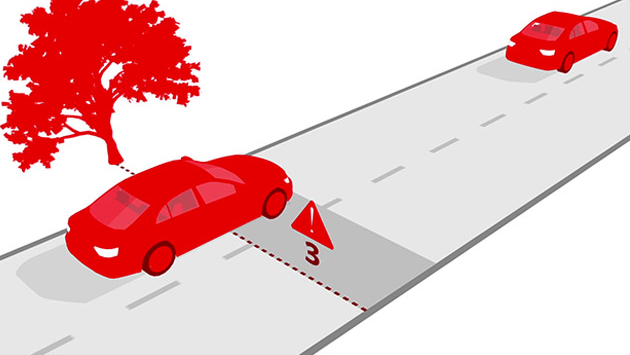How to Drive Safely in Strong Wind and Rain

Travelers is proud to work with the finest Independent Agents
(MUSIC PLAYING)
(DESCRIPTION)
Travelers white umbrella
TEXT: HOW TO DRIVE SAFELY IN STRONG WIND AND RAIN
An animation of the Travelers white umbrella logo widens over an animation of a house with a car parked in its driveway, a yard surrounded by trees, and a mailbox at the end of the property. Raindrops begin to fall around the animation of the house and its property.
(SPEECH)
Severe weather can turn from bad to worse in an instant.
(DESCRIPTION)
An animation of a person who drives a car down a road in rainy conditions.
(SPEECH)
When you're on the road, the stakes can be even higher.
(DESCRIPTION)
An animation of a person who drives a car down a road in rainy conditions past a sign that reads, speed limit 50.
(SPEECH)
During strong winds, being alert and attentive is key.
(DESCRIPTION)
An animation of a tractor trailer truck that swerves down a rainy road.
(SPEECH)
Notice larger vehicles that may have difficulty staying in their lanes.
(DESCRIPTION)
An animation of a person who drives a car over a suspension bridge in rainy weather.
(SPEECH)
Anticipate gusts, especially when driving through wind-prone areas like overpasses. And keep a firm grip on the wheel. In heavy rain, it's harder to see and more difficult to stop.
(DESCRIPTION)
An animation of a person who turns on their car headlights as they drive down a road in rainy weather.
(SPEECH)
Turn on your headlights to help other drivers see you. Take your time. Slow and steady is a good way to help keep control of your vehicle.
(DESCRIPTION)
An animation of a person who drives a car up close to the bumper of the pickup truck in front of them on the road in rainy weather, then moves back and widens the distance between them.
(SPEECH)
And give other vehicles more space. Some additional following distance can make all the difference.
(DESCRIPTION)
An animation of a person who drives their car into the driveway of a house during rainy conditions.
(SPEECH)
Keep in mind, when severe weather hits, sometimes the best driving decision is to stay off the road.
(DESCRIPTION)
Travelers white umbrella
TEXT: VISIT TRAVELERS.COM
HOW TO DRIVE SAFELY IN STRONG WIND AND RAIN
© 2018, The Travelers Indemnity Company. All rights reserved. Travelers and the Travelers Umbrella logo are registered trademarks of the Travelers Indemnity Company in the U.S. and other countries.
(SPEECH)
Visit travelers.com for more tips on staying one step ahead.
(MUSIC PLAYING)
Driving in conditions that involve strong wind or heavy rain can be relatively common and may not be the most pressing safety concern for many drivers, but Travelers safety professionals know that driving in severe weather can significantly increase the risk of a dangerous situation for you, your family and other drivers. Severe weather demands your undivided attention, so be sure to reduce driving distractions by turning the radio down and turning off and stowing your phone to help you keep your attention fully on the road. Keep in mind that sometimes the best decision you can make is to avoid driving altogether and to stay off the road completely until the weather clears.
Driving in heavy winds
Wind may not seem like it can present a significant risk, but strong wind deserves special consideration from drivers. Strong wind can occur just about anywhere, but it can be more common in wide-open spaces. Areas for concern also include highway overpasses, tunnels and “road cuts” through mountainous areas that can act as funnels for wind. The following tips can help keep you on the road and safe if you encounter heavy winds.
- Anticipate gusts. Take special care when driving through areas prone to strong winds or when weather reports predict severe weather.
- Notice larger vehicles. Be aware of large vehicles on the road such as tractor-trailers and recreational vehicles. They are more susceptible to high winds and drivers may have difficulties staying in their lanes.
- Keep a firm grip on the wheel. Keep both hands on the wheel in case the wind begins to move your vehicle, especially if you are driving a large vehicle or towing a trailer.
Driving in heavy rain
In addition to the potentially poor visibility that accompanies most heavy rain, drivers should be ready to protect themselves against hydroplaning. Hydroplaning can occur when a vehicle is traveling too fast in heavy rain conditions, causing the vehicle’s tires to travel on a thin layer of water rather than gripping the surface of the road. This has the potential to make steering and braking difficult and could even lead to losing control of your vehicle. Follow these tips to help you stay safe while driving in heavy rain.
- Take your time. Slow down to help avoid hydroplaning. Also, one of the most dangerous times to drive can be soon after it begins to rain. The rain can cause oils on a roadway to rise to the surface and make conditions slick. Waiting a while after rains begin, rather than rushing to your destination, can be a safer plan when it is raining.
- Turn your lights on. Turning on your headlights can help you see more clearly and also helps other vehicles see you. Many states require the use of headlights during rain.
- Give other vehicles more space. Add 1-2 extra seconds of following time in the rain, which gives you, and the cars behind you, more time to react to traffic.
For more tips on driving in severe weather, click here.



